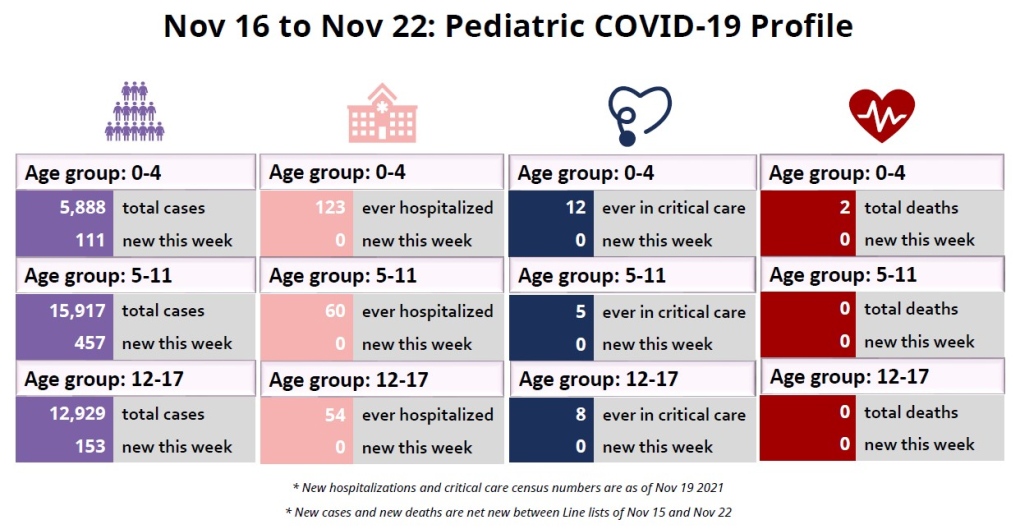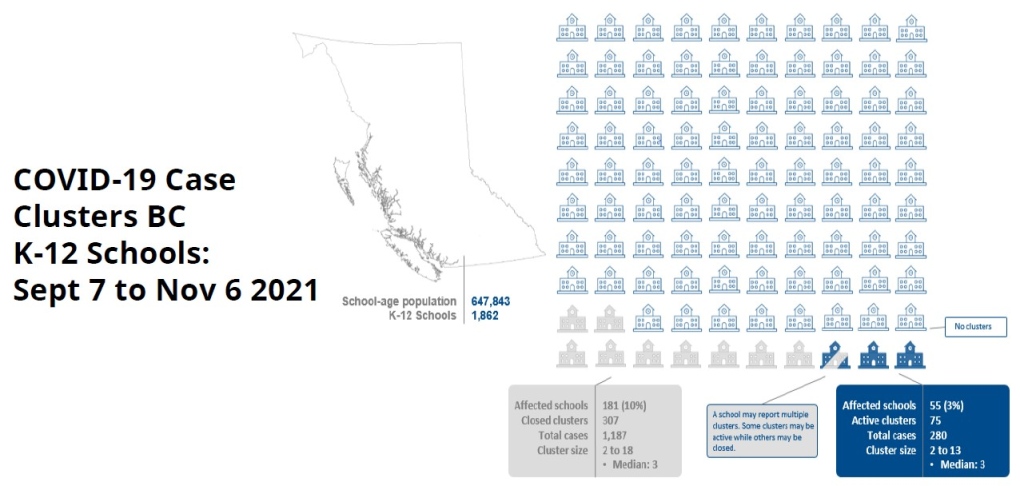Unvaccinated kids under 12 now make up 20% of B.C.'s COVID-19 cases
Children under age 12 now make up about 20 per cent of British Columbia's COVID-19 cases, health officials revealed Tuesday while presenting their plans for vaccinating kids as young as five.
There were 568 confirmed cases involving infants, toddlers and children up to age 11 from Nov. 16 to 22, according to new data from the B.C. Centre for Disease Control. The government announced 2,679 cases in total over that seven-day period.
Children between the ages of five and 11, who just recently become eligible for the Pfizer-BioNTech vaccine, accounted for 457 of those.
That age group has been vastly overrepresented in the province's COVID-19 case numbers since transmission exploded near the start of the school year – while children under 12 have made up 20 per cent of recent cases, they represent just 10 per cent of B.C.'s population.
But provincial health officer Dr. Bonnie Henry noted Tuesday that transmission has been decreasing across the board in recent weeks, including among those age five to 11.

She also noted there were no COVID-19 hospitalizations in that age group from Nov. 16 to 22, and there have been no COVID-19 deaths among B.C.'s school-aged children so far.
"I think that's really important for us to remember," Henry said. "This virus, thankfully, does not cause as severe disease in most children."
Since the start of the pandemic, 183 children under the age of 12 have been hospitalized in B.C., and 17 have ended up in critical care. The deaths of one infant and one toddler, both recorded earlier this year, have been blamed on COVID-19 as well.
There have been 19 cases of multisystem inflammatory syndrome in children, or MIS-C, each of which required hospitalization, and Henry noted that kids can also suffer long-haul coronavirus infections.
"Children are not immune, and some of them will have severe illness and some of them will require critical care," Henry added.
"We know that it's important to protect children individually, because we can't always tell who's going to get the severe disease. But it's also important to allow children and families to get over some of the very severe disruptions we've had from the pandemic in our lives."

Health officials also presented updated data on COVID-19 cases in schools, which has led to much anxiety among some parents and teachers this year, particularly given the rise of the more contagious Delta variant.
There have been 2,975 exposure notifications across 835 schools since the start of the fall semester, more commonly in parts of the province with increased transmission and lower vaccination, such as the Interior and North.
Those notifications are triggered whenever someone enters a school while infected, whether or not it results in any additional cases.
Those were linked to 382 clusters – defined as incidents involving two or more cases and transmission that is believed to have occurred on school grounds – resulting in 1,187 infections.
About 12 per cent of schools experienced a cluster from the start of the school year to Nov. 6, Henry said.
"So in 88 per cent of our schools across this province, we have not had any transmission events. I think that's good news," she added. "It tells us what's happening in the schools is working to support children."

The median number of cases associated with clusters has increased this school year, going to three from two, which officials also blamed on the Delta variant.
But a new BCCDC investigation into B.C.'s school clusters found "most of the transmission in school-aged children happens in the community or at home," Henry said.
Canada's first doses of COVID-19 vaccine developed specifically for children between the ages of five and 11 recently arrived in the country, and B.C. announced Tuesday that invitations to book appointments will be going out to families next week.
There are about 360,000 children in that age group, and 91,000 have already been registered for their shot, according to health officials.
Unlike previous vaccine rollouts, appointments for children ages five to 11 are mandatory.
The dose they will be receiving is smaller – just 10 milligrams, compared to 30 milligrams for adults – which was determined to build just as strong an immune response in that age group. Henry noted it's not because of their comparably small size, but "because our immune systems when we're younger are just that much more responsive."
CTVNews.ca Top Stories

Richard Perry, record producer behind 'You're So Vain' and other hits, dies at 82
Richard Perry, a hitmaking record producer with a flair for both standards and contemporary sounds whose many successes included Carly Simon’s 'You’re So Vain,' Rod Stewart’s 'The Great American Songbook' series and a Ringo Starr album featuring all four Beatles, died Tuesday. He was 82.
Hong Kong police issue arrest warrants and bounties for six activists including two Canadians
Hong Kong police on Tuesday announced a fresh round of arrest warrants for six activists based overseas, with bounties set at $1 million Hong Kong dollars for information leading to their arrests.
Read Trudeau's Christmas message
Prime Minister Justin Trudeau issued his Christmas message on Tuesday. Here is his message in full.
Stunning photos show lava erupting from Hawaii's Kilauea volcano
One of the world's most active volcanoes spewed lava into the air for a second straight day on Tuesday.
Indigenous family faced discrimination in North Bay, Ont., when they were kicked off transit bus
Ontario's Human Rights Tribunal has awarded members of an Indigenous family in North Bay $15,000 each after it ruled they were victims of discrimination.
What is flagpoling? A new ban on the practice is starting to take effect
Immigration measures announced as part of Canada's border response to president-elect Donald Trump's 25 per cent tariff threat are starting to be implemented, beginning with a ban on what's known as 'flagpoling.'
Dismiss Trump taunts, expert says after 'churlish' social media posts about Canada
U.S. president-elect Donald Trump and those in his corner continue to send out strong messages about Canada.
Heavy travel day starts with brief grounding of all American Airlines flights
American Airlines briefly grounded flights nationwide Tuesday because of a technical problem just as the Christmas travel season kicked into overdrive and winter weather threatened more potential problems for those planning to fly or drive.
King Charles III is set to focus on healthcare workers in his traditional Christmas message
King Charles III is expected to use his annual Christmas message to highlight health workers, at the end of a year in which both he and the Princess of Wales were diagnosed with cancer.

































